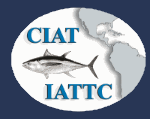Funded
Click to see projects by theme, goal or target:
- Objectives
- Obtain data that will contribute to, and reduce uncertainty in, EPO tuna stock assessments, particularly for skipjack tuna;
- Obtain information on the rates of movement, dispersion, and mixing of skipjack, yellowfin, and bigeye tunas in the EPO, and between this region and other adjacent regions of the Pacific basin; and
- Obtain estimates of sex-specific growth, mortality, abundance, selectivity, and exploitation rates for those species of tuna in the EPO
- Background
- This project is described in detail in Appendix 2 of Document CAF-05-04, prepared for the meeting of the Committee on Administration and Finance in July 2017
- Duration
- 5 years (2019-2023)
- Workplan and status
- Phase 2 of the IATTC multi-year regional tuna tagging project will consist of two tagging cruises conducted during 2020 and 2022 of approximately 90 days each.
- A pole-and-line live-bait tuna fishing vessel has been chartered to conduct a tuna tagging cruise during the period of February through April of 2020.
- Permits have been obtained from the Government of Ecuador and the Galapagos National Park, as well as the Government of Panama, and the Government of Mexico and the Revillagigedo Islands National Park for catching bait and fishing/tagging tunas during the 2020 tagging cruise period.
- The 2020 cruise plan included going directly from the vessel’s homeport of San Diego to the Galapagos Islands to begin fishing/tagging operations, focusing on SKJ.
- The 2022 cruise plan is modified from 2020 as it was deemed catching bait within the Galapagos National Park wasn’t possible in sufficient quantities to justify returning.
- Updated date: 01 Feb 2023
- Progress summary for the reporting period
- The initial Phase 1 85-day tagging cruise (6 March to 30 May 2019), aboard a chartered live-bait pole-and-line vessel operating off Central America and northern South America, was unsuccessful. No concentrations of skipjack, bigeye, or yellowfin tunas were found in unassociated or associated schools within the areas for which permits were obtained.
- A total of only 1,455 tunas were tagged: 220 skipjack (43 with archival tags (ATs)), 189 bigeye (46 with ATs), and 1,046 yellowfin (242 with ATs).
- The first Phase 2 89-day tagging cruise (1 February to 30 April 2020), aboard a chartered live-bait pole-and-line vessel operating off Central America and northern South America, including around the Galapagos Islands, was successful.
- A total of only 6,328 tunas were tagged: 6039 skipjack (185 with (ATs)), 274 yellowfin (9 with ATs), 8 bigeye (0 with ATs), and 7 fish not identified at the time of release.
- The second phase 2 tagging cruise and 3rd of the series executed under the RTTP was (1 March to May 2022) conducted aboard US flagged pole-and-line fishing vessel and operated across a wide area of the eastern Pacific Ocean, including the gulf of Panama for capturing and loading bait. Efforts were largely unsuccessful tagging a total of 1,115 tunas, 161 skipjack (26 with (ATs)), 829 yellowfin (221 with ATs), 125 bigeye (11 with ATs).
- Challenges and key lessons learnt
- Phase 2 of the IATTC RTTP - EPO will consist of two tagging cruises conducted during 2020 and 2022 of approximately 90 days each.
- A pole-and-line live-bait tuna fishing vessel was chartered to conduct a tuna tagging cruise during the period of February through April of 2020.
- Permits obtained from the Government of Ecuador and the Galapagos National Park, as well as the Government of Panama, and the Government of Mexico and the Revillagigedo Islands National Park for catching bait and fishing/tagging tunas during the 2020 tagging cruise period.
- The 2020 cruise plan included going directly from the vessel’s homeport of San Diego to the Galapagos Islands to begin fishing/tagging operations, focusing on SKJ.
- The 2022 cruise plan was modified from 2020 as it was deemed catching bait within the Galapagos National Park wasn’t possible in sufficient quantities to justify returning.
- For the 2022 cruise, while exhaustive efforts were taken by IATTC staff and government officials in Mexico, permits for the Revillagigedo islands were not granted, hampering the tagging efforts.
- Presentation at the May 2020 IATTC SAC Meeting

